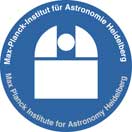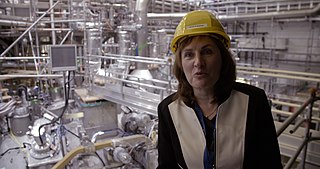Related Research Articles

The Max Planck Society for the Advancement of Science is a formally independent non-governmental and non-profit association of German research institutes. Founded in 1911 as the Kaiser Wilhelm Society, it was renamed to the Max Planck Society in 1948 in honor of its former president, theoretical physicist Max Planck. The society is funded by the federal and state governments of Germany.
Klaus Ferdinand Hasselmann is a German oceanographer and climate modeller. He is Professor Emeritus at the University of Hamburg and former Director of the Max Planck Institute for Meteorology. He was awarded the 2021 Nobel Prize in Physics jointly with Syukuro Manabe and Giorgio Parisi.

The Max-Planck-Institut für Astronomie is a research institute of the Max Planck Society (MPG). It is located in Heidelberg, Baden-Württemberg, Germany near the top of the Königstuhl, adjacent to the historic Landessternwarte Heidelberg-Königstuhl astronomical observatory. The institute primarily conducts basic research in the natural sciences in the field of astronomy.

The Max Planck Institute for Chemistry is a non-university research institute under the auspices of the Max Planck Society in Mainz. It was created as a Kaiser Wilhelm Institute in 1911.

Carlos Silvestre Frenk is a Mexican-British cosmologist and the Ogden Professor of Fundamental Physics at Durham University. His main interests lie in the fields of cosmology, galaxy formation and computer simulations of cosmic structure formation.
The Max Planck Institute for Dynamics and Self-Organization in Göttingen, Germany, is a research institute for investigations of complex non-equilibrium systems, particularly in physics and biology.

The Wendelstein 7-X reactor is an experimental stellarator built in Greifswald, Germany, by the Max Planck Institute for Plasma Physics (IPP), and completed in October 2015. Its purpose is to advance stellarator technology: though this experimental reactor will not produce electricity, it is used to evaluate the main components of a future fusion power plant; it was developed based on the predecessor Wendelstein 7-AS experimental reactor.

The Max Planck Institute for the Science of Light (MPL) performs basic research in optical metrology, optical communication, new optical materials, plasmonics and nanophotonics and optical applications in biology and medicine. It is part of the Max Planck Society and was founded on January 1, 2009 in Erlangen near Nuremberg. The institute is based on the Max Planck Research Group "Optics, Information and Photonics", which was founded in 2004 at the University of Erlangen-Nuremberg, as a precursor. The institute currently comprises four divisions.

The Max Born Medal and Prize is a scientific prize awarded yearly by the German Physical Society (DPG) and the British Institute of Physics (IOP) in memory of the German physicist Max Born, who was a German-Jewish physicist, instrumental in the development of quantum mechanics. It was established in 1972 after the death of Born in 1970, and first awarded in 1973.

The Max-Planck-Institute of Quantum Optics is a part of the Max Planck Society which operates 87 research facilities in Germany.
David Phillip Woodruff FRS is a British physicist, professor at University of Warwick, and member of the Surface, Interface & Thin Films group.
Rudolf Gorenflo was a German mathematician.

Andrew Peter Mackenzie is a director of Physics of Quantum Materials at the Max Planck Institute for Chemical Physics of Solids in Dresden, Germany and Professor of Condensed Matter Physics at the University of St Andrews, Scotland. He became a co-editor of the Annual Review of Condensed Matter Physics as of 2020.

Sibylle Günter is a German theoretical physicist researching tokamak plasmas. Since February 2011, she has headed the Max Planck Institute for Plasma Physics. In October 2015, she was elected a member of the Academia Europaea in recognition of her contribution to research.
Sigfried Bethke is a German physicist and science manager.
Miklos Porkolab (born March 24, 1939) is a Hungarian-American physicist specializing in plasma physics.
Nuclear Fusion is a peer reviewed international scientific journal that publishes articles, letters and review articles, special issue articles, conferences summaries and book reviews on the theoretical and practical research based on controlled thermonuclear fusion. The journal was first published in September, 1960 by IAEA and its head office was housed at the headquarter of IAEA in Vienna, Austria. Since 2002, the journal has been jointly published by IAEA and IOP Publishing.
Gregor Eugen Morfill is a German physicist who works in basic astrophysical research and deals with complex plasmas and plasma medicine.
Friedrich E. Wagner is a German physicist and emeritus professor who specializes in plasma physics. He was known to have discovered the high-confinement mode of magnetic confinement in fusion plasmas while working at the ASDEX tokamak in 1982. For this discovery and his subsequent contributions to fusion research, was awarded the John Dawson Award in 1987, the Hannes Alfvén Prize in 2007 and the Stern–Gerlach Medal in 2009.

Petr Heinzel is a Czech astronomer and professor who is specialized in Solar Physics. From 2004 to 2012 he was director of the Astronomical Institute of the Czech Academy of Sciences. In 2012 he was appointed Professor of Astronomy and Astrophysics at Charles University, Czech Republic. Since, 2017, he is chair of the Czech Astronomical Society. He is also a member of the International Astronomical Union.
References
- ↑ "Prof. Dr. Alexander M. Bradshaw". Max-Planck Institute for Plasma Physics. Retrieved 24 September 2017.
- ↑ "Alexander Bradshaw, Prof. Dr., Curriculum Vitae". Max-Planck-Gesellschaft. Archived from the original on 12 May 2011. Retrieved 24 September 2017.
- ↑ "Prof. D. Phil Woodruff FRS". Warwick University. Retrieved 24 September 2017.